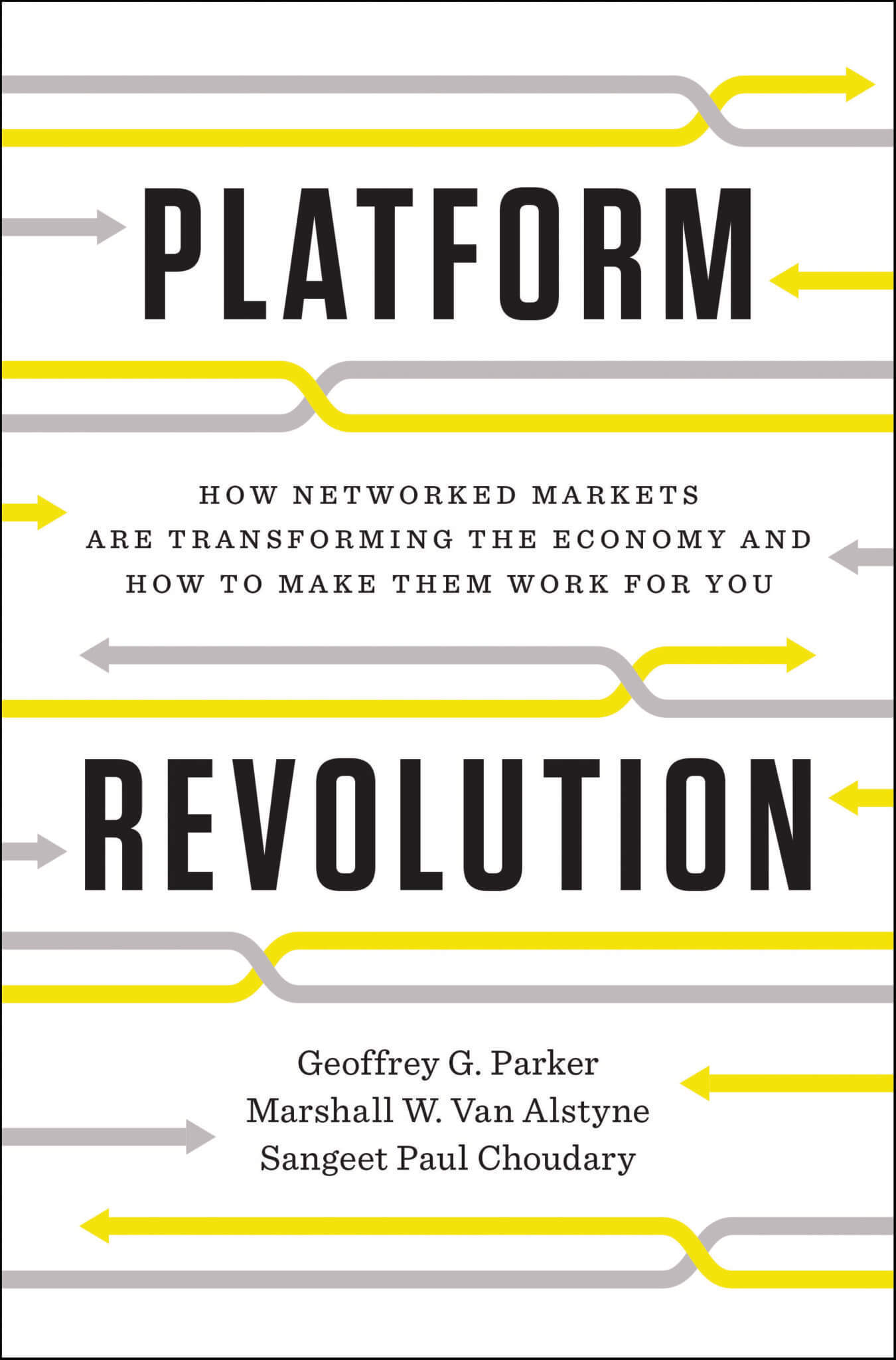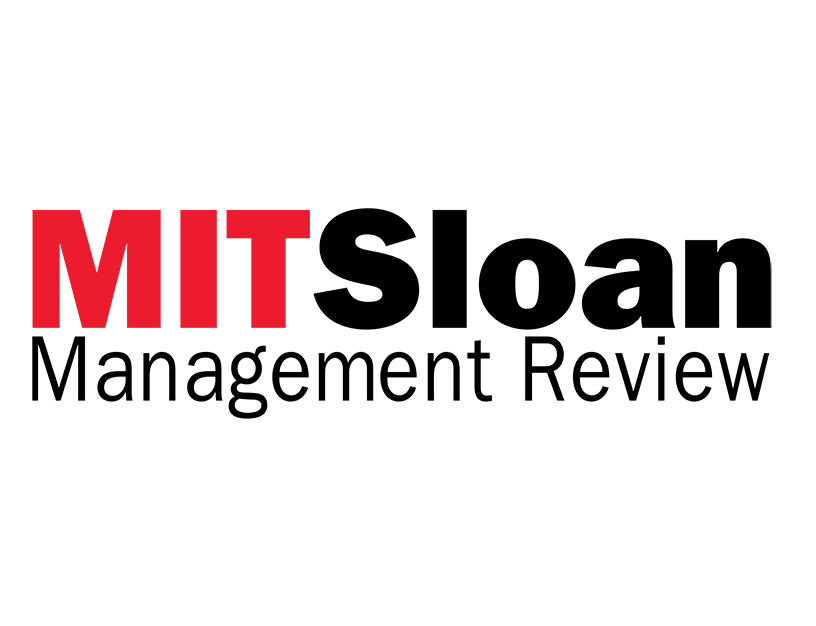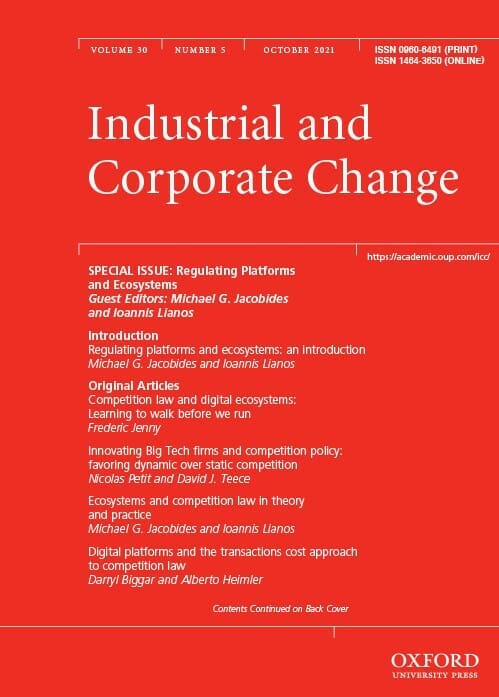Videos
Learn More About Marshall Van Alstyne
Today’s businesses are at an inflection point. Platform-enabled firms such as Amazon, Apple, Meta, and Alibaba, are dominating the digital economy because they operate as value-creating ecosystems that leverage network effects and third-party users. Organizations that aren’t set up to do the same are missing out on huge opportunities, says renowned digital economist Marshall Van Alstyne, Ph.D., the Questrom Chair of Information Systems at Boston University’s Questrom School of Business, a digital fellow at the MIT Initiative on the Digital Economy and a 2024-2025 visiting scholar at the Berkman Klein Center for Internet & Society’s Institute for Rebooting Social Media at Harvard.
Co-author of the international bestseller, “Platform Revolution: How Networked Markets Are Transforming the Economy―and How to Make Them Work for You” (W.W. Norton & Co., 2016) – the first authoritative, fact-based guide to understanding and navigating platform models – the book continues to prove its importance to modern business strategy. As of March 2022, it had reached more than a quarter million dollars in sales and the accompanying 2016 Harvard Business Review (HBR) article was featured in four of HBR’s Must-Read volumes, a major sign that platforms will continue to revolutionize the entire business landscape.
A dynamic and sought-after executive educator who received the prestigious Herbert Simon Award in November 2022 and has been named among the top 50 management thinkers in the world, Van Alstyne is a pioneering authority on two-sided markets. When teaching C-suite leaders how a platform model can help their organization exponentially drive growth and better compete, he points to the many ways industries have been transformed: HMOs match patients and physicians. Real estate and auction networks match buyers and sellers. Airline reservation systems match travelers to airline flights. Retail electric markets are evolving into platforms that match consumers with specific power producers. And those are just a few examples, he emphasizes.
“The proven success of platforms has prompted many traditional businesses to adopt the model, even newspapers and the U.S. Postal Service,” explains Van Alstyne who was named among the top 2% of scientists having global influence. “In creating strategies for platform markets, however, many leaders make the mistake of relying on assumptions and paradigms that apply to businesses without network effects. As a result, they make decisions around pricing, supply chains, product design, and strategy that are not appropriate for the economics of their changing industries. Part of my work involves teaching them how to avoid those costly mistakes.”
Van Alstyne points out that a century ago, businesses operated in a supply side economy. Today, platforms driven by network effects that leverage third party users have created a demand-side economy, a business model he refers to as an “inverted firm.” This means value creation shifts from inside to outside the organization, from employees to ecosystem partners, and from products to platforms. In his popular executive education course, “Digital Platform Strategy,” he teaches leaders how they can adopt a platform model and why it’s important to the long-term survival of their organization in an increasingly competitive digital economy. In the process, he highlights success stories within such companies as Allstate, eBay, edX, Jawbone, Haier, Huawei, Mahindra, Pearson Publishing, PTC, Siemens, SAP, and Tencent, which illustrate how organizations were able to solve problems and markedly scale business by transitioning to a platform model. He also illuminates the ability for new tools such as Application Programming Interfaces (APIs) to further boost value, and his Customer Lifetime Value (CLV) framework which helps decision makers measure the worth of investing in and retaining customers – a particularly valuable tool for professionals working in mergers & acquisitions. In 2010, Alstyne was the first to conduct research into the true value of APIs. He recently updated that study which shows that, over a 16-year period, firms adopting APIs saw a whopping 38% more growth than those who didn’t.
“It’s no overstatement to say that the platform business model is one of the most important economic and social developments of our time,” Van Alstyne explains. “Structural change in the Internet era is as significant as the Industrial Revolution was a century ago. But surprisingly, many people, even savvy business executives, remain unaware of how this is happening or what to do about it. Bottom line: Platforms beat products every time and they are just beginning to revolutionize a range of economic and social arenas from B2B to B2C, and from health care and finance to energy and government.”
# # #
Marshall Van Alstyne is an information economist and expert on IT economics and strategy. He’s made fundamental contributions to IT productivity and theories on network effects. His co-authored article, “Strategies for Two-Sided Markets,” is an all-time Harvard Business Review top 50 and is taught in business schools worldwide. His “Pipelines, Platforms and New Rules of Strategy” is a Harvard Business Review “must read” for anyone interested in strategy and innovation.
A frequently cited, award-winning academic, Van Alstyne (along with co-author Geoff Parker) was a 2021 and 2022 co-recipient of the Antitrust Writing Award for best academic article. He holds multiple patents on privacy protection and spam prevention methods, and he was among the first to measure the dollar value of social networks. Van Alstyne, with Parker, co-founded the MIT Platform Summit and Boston University Symposium, which they have co-chaired since 2013. In 2020, Van Alstyne received the Inaugural Practical Impacts Award from the Information Systems Society of the Institute for Operations Research and the Management Sciences. Van Alstyne and Parker’s work was recognized by Thinkers50 in 2023 and 2021 when they were named among the top 50 management thinkers in the world and in 2019 when they won the Digital Thinking Award. In 2023, they were both named Marketplace Thought Leaders by Marketplace 50.
Van Alstyne is regularly interviewed by Bloomberg, The Economist, The New York Times, The Wall Street Journal, National Public Radio, and others. He received his bachelor’s degree in computer science from Yale University, and both his master’s and doctorate in Information Systems Economics from MIT.
Marshall Van Alstyne is available to advise your organization via virtual and in-person consulting meetings, interactive workshops and customized keynotes through the exclusive representation of Stern Speakers & Advisors, a division of Stern Strategy Group®.
Marshall Van Alstyne is also available to conduct workshops on the below topics or serve as an advisor to leaders interested in digitally transforming their organizations.
The “Inverted Firm” Creates More Value by Leveraging Network Effects and Community Connections
The rise of digital firms in the internet era – gigantic monopolies such as Meta, Amazon and Alibaba – is analogous to the rise of firms in the industrial era, but for completely opposite reasons, says renowned digital economist Marshall Van Alstyne, Ph.D., professor of information economics at Boston University’s Questrom School of Business, digital fellow at the MIT Initiative on the Digital Economy, and co-author of the international bestseller “Platform Revolution.” A century ago, businesses operated in a product-focused supply side economy. Today, the success of platform-based digital giants is driven by network effects that leverage third party users in a demand-side economy – a business model Van Alstyne refers to as an “inverted firm”. In this talk, he explains how the inverted firm model shifts value creation from inside to outside the organization, from employees to ecosystem partners, and from products to platforms. He then discusses the importance of adopting the model to better compete in today’s economy and what it takes to make the transition.
The API Advantage: Using Platform-based Tools to Significantly Boost Value
If your firm is not taking full advantage of Application Programming Interfaces (APIs), you may want to re-think your strategy, says renowned digital economist Marshall Van Alstyne, Ph.D., professor of information economics at Boston University’s Questrom School of Business, digital fellow at the MIT Initiative on the Digital Economy, and co-author of the international bestseller “Platform Revolution.” APIs allow valuable software and data in one system to talk to valuable software and data in another system, repeatedly and at scale. This makes them key mechanisms in how value gets exchanged in digital economies, with developers assembling APIs to create modern apps, letting those apps communicate, and combining them with cloud services. In 2010, Alstyne was the first to conduct research into the true value of APIs, a study he recently updated. In this talk, he shares his findings which showed that, over a 16-year period, firms that adopted APIs saw a whopping 38% more growth than those who didn’t. He then explains how your firm can strategically integrate them.
How to Estimate Customer Lifetime Value in the Digital Marketplace
How do businesses estimate customer lifetime value in the digital economy? What is a customer or merchant worth when the product is free? “Many of these decisions are made in the dark,” says renowned digital economist Marshall Van Alstyne, Ph.D., professor of information economics at Boston University’s Questrom School of Business, digital fellow at the MIT Initiative on the Digital Economy, and co-author of the international bestseller “Platform Revolution.” In this presentation, Van Alstyne gives participants a preview of his yet-to-be-released research that offers decision makers in every sector a model for estimating customer lifetime value in network marketplaces – a technique that, to the best of his knowledge, may well be the first of its kind. For leaders investing in marketing, social networks, or new technologies, Van Alstyne’s framework helps guide decision making so they can focus on the right audience and optimize spending.
Rethinking Mergers and Acquisitions Processes in the Digital Economy
Many firms make decisions around investing or divesting without fully realizing the true value of what they are buying, or worse, what they are selling off. In the digital economy, traditional thinking around mergers and acquisitions doesn’t work, says renowned digital economist Marshall Van Alstyne, Ph.D., professor of information economics at Boston University’s Questrom School of Business, digital fellow at the MIT Initiative on the Digital Economy, and co-author of the international bestseller “Platform Revolution.” An investment that may appear low margin, he explains, may actually offer a tremendous opportunity for engagement. “When Johnson & Johnson sold off their diabetes division, they lost a huge community that could have generated significant value at a relatively low margin of cost.” In this talk, Van Alstyne explains how value is a created in a platform-driven economy where firms leverage third-party users through network effects. Based on his extensive research, he offers participants a new way of looking at how and when to acquire, who to partner with, and where the true value of an organization lies. “It is no longer about your own assets but the assets of the community or partner you are acquiring.”
Power of the Platform: How to Harness the Platform Revolution to Future-Proof Your Business
Platform businesses have existed for years. Malls link consumers and merchants. Newspapers connect subscribers and advertisers. What’s changed today is that information technology (IT) has profoundly reduced the need to own physical infrastructure and assets, making building and scaling platforms vastly simpler and cheaper. The digital platform model is the future of business, and those that fail to learn the new rules will struggle to compete, says Marshall Van Alstyne, Ph.D. Based on his internationally bestselling book “Platform Revolution,” he offers leaders a roadmap for how to run a successful platform business today. In this presentation, he reveals strategies behind some of the most successful platform-based companies — including up-and-coming digital companies like Tinder and SkillShare and traditional companies like Nike and McCormick Spice — who have built platforms in non-technology markets. He also shows how platform strategies drive growth at large industrial and B2B firms such as Siemens, Mahindra and John Deere. Through a wider lens, he then offers participants a window into which markets are ripe for a platform revolution, including health care, finance, construction, education and energy, and explains how to navigate in and adapt to the changing marketplace. Van Alstyne also shows why platforms almost always beat products.

Platform Revolution: How Networked Markets Are Transforming the Economy - and How to Make Them Work for You
(W. W. Norton & Company, March 2016)

Digital Platforms and Antitrust
(The Oxford Handbook of Institutions and International Economic Governance and Regulation, January 2022)

The EU Digital Markets Act: A Report From a Panel of Economic Experts
(Publications Office of the European Union, 2021)

How Users Drive Value in Two-sided Markets: Platform Designs that Matter
(Stanford Digital Economy Lab, August 2020)
Platform Strategy: Generate Significant Value and Outpace Competitors with a 21st Century Operating Model
Platform-enabled firms such as Alibaba, Amazon, Apple, Meta, and SalesForce are wildly successful because they operate as ecosystems that create value by leveraging network effects and third-party users.
“Platforms are economically important and widely observed in modern economies,” explains says renowned digital economist Marshall Van Alstyne, Professor of Information Economics at Boston University’s Questrom School of Business, Digital Fellow at the MIT Initiative on the Digital Economy, and co-author of the international bestseller “Platform Revolution.” “In creating strategies for platform markets, however, many leaders make the mistake of relying on assumptions and paradigms that apply to businesses without network effects. As a result, they make decisions around pricing, supply chains, product design, and strategy that are not appropriate for the economics of their changing industries. Part of my work involves teaching them how to avoid those costly mistakes.”
As an advisor to CTOs, CIOs, CSOs, CEOs, and CMOs, Van Alstyne teaches leaders how their organizations can generate significant value and better compete in the digital marketplace by adopting a platform model. In the process, he shares examples of how leading companies were able to solve problems and markedly scale business by transitioning to a platform model. During virtual or in-person advisory meetings or executive education workshops, which can be customized to meet the needs of your organization, Van Alstyne can cover any or all of the following topics:
- Platforms and Ecosystems
- Business Model Innovation
- The Inverted Firm: How Demand-side Economies of Scale Have Replaced Supply-side
- Mergers & Acquisitions in Network Marketplaces
- Measuring Customer Lifetime Value
- Leveraging Application Programming Interfaces (APIs)
- Implicit Versus Explicit Network Effects
- Harnessing the Marketing Power of External Communities
- Using APIs to Create More Value
- Valuation of Information, Data & Digital Twins
- Input Suppliers, Markets, and True Platforms
- Competing in Winner-takes-all Markets
- One-sided Versus Two-sided Networks
- The Context of Multi-homing
- Traditional Platform Pricing Models Including Freemium, Bundled, and Two-sided Pricing
- Barriers Firms Face in Transitioning to a Platform Model
- Strategies for Launching New Platforms and the Process of Making Markets
- Recovery Strategies in Declining Platform Markets
- Timing in the Cannibalization of an Old Platform by a New One
- Data Analytics Tools for Recommender Systems and Matchmaking
- Anti-trust Implications of Platform Strategies and Safe Harbor Defenses
Praise for "Platform Revolution"
“Thorough and often provocative.”
“An authoritative guide to the role of online platforms: what they are, how they work, and what they mean for business and economics. Platform Revolution demystifies the concept by providing clear prose, insightful examples, and practical lessons.”
“Platforms have transformed the economy over the last two decades, but the biggest effects are yet to come. Platform Revolution provides the first comprehensive framework for platform strategy and for predicting the winners and losers of future disruptions.”
“Platform Revolution is a manual for the disruption of your industry. You can either read it or try to keep it out of the hands of your competitors―present and future. I think it’s an easy call.”
“Platform Revolution provides an exceptional synthesis of cutting-edge research that makes it must-reading for my MBA students. A key insight is that platform strategies can benefit all participants when they understand the underlying economics. Read the book and share it with your business partners. You’ll be glad you did.”
“In a very cohesive and comprehensive way, the authors provide deep conceptual insights and rich practical advice on platforms, the most important business organizations of our time.”
“In the digital economy, platforms are transforming industries at high speed. Platform Revolution is an inspiring guide for business leaders to transform existing businesses to platform businesses.”














































